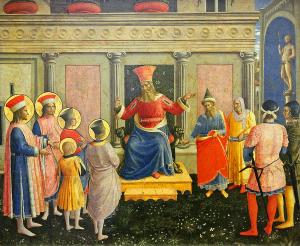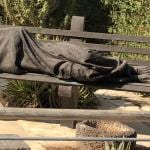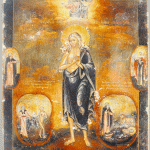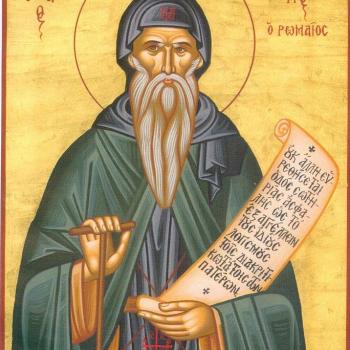
Sts. Cosmas and Damian were famous for being physicians who helped those in need without looking for any payment in return. That is, they gave their medical services for free. They did so as Christians, following the example of Christ, who likewise healed people without recompense. They were well trained in the faith by their mother, St. Theodota. She taught them the faith, and also taught them what the faith expected from them. She instilled in them a passion for their neighbor. She guided their faith formation (for their father had been a pagan, and had died when they were young).
St. Cosmas and Damian lived exemplary Christian lives, even as they were exceptional in their medicinal abilities (which made many people think of them as being miracle workers) Certainly, the Holy Spirit was active with them, helping them in their work, and yet, it was the discipline and training of their youth, the discipline and training given to them by their mother, which helped them grow in the Christian faith, grow in the Spirit, and become truly remarkable men of God. And yet, in the end, they showed that all they did was for Christ, as they willingly died as martyrs during the reign of Diocletian. They show us that physicians do not have to be greedy, that people truly can take up medicine, not for money but out of concern for others.
Today, the medical industry suffers because so many involved in it are only concerned about profits. For many, the reason why people become doctors is to make money, and not because people can actually care about the welfare of others. This is why so many needless suffer and perish, not because doctors could do nothing for them, but because many are unwilling to do so if they are not being paid. Physicians certainly need to be able to survive, but if the economic system were just and equitable, they would be able to do so without seeking ungodly profits. Physicians, especially those claiming to be Christian, should heed the warning implicit in the story of Lazarus and Dive. That is, they must not follow the example of Dives, the rich man who ignored the plight of Lazarus:
There was a rich man, who was clothed in purple and fine linen and who feasted sumptuously every day. And at his gate lay a poor man named Lazarus, full of sores, who desired to be fed with what fell from the rich man’s table; moreover the dogs came and licked his sores. The poor man died and was carried by the angels to Abraham’s bosom. The rich man also died and was buried; and in Hades, being in torment, he lifted up his eyes, and saw Abraham far off and Lazarus in his bosom (Lk 16:-23 RSV).
Now, it is true, some doctors do great work, and do so out of charity. But, many of those who reject notions of universal health care say that we would not get good physicians if we considered healthcare to be a right instead of a commodity to be bought and sold. This response is patently false. Medicine would continue to be practiced, and medical science, seeking better cures for our ailments, would continue if healthcare were no longer a for-profit enterprise. Physicians have not always sought such excess; many, like Cosmas and Damian, become doctors because they care about the welfare of others. But, when we tell others to become doctors because they can become rich, we turn healthcare upside-down and we risk having doctors who will not seek to cure their patients, but only give them palliatives, so that their patients will consistently return to them, becoming a constant source of revenue. On the other hand, if a financial incentive was no longer a motive for medicine, then healthcare, and curing diseases, and saving lives, would be the incentive, one which would motivate doctors because they realize that they will one day also be needing such care for themselves. Medical science will continue because doctors, like everyone else, do not want to be sick or injured themselves.
Those physicians who can help those in need, but ignore them, because those in need are not wealthy, are like Dives; even though they might become wealthy, they will find such wealth is of no use to them in the end. They will have wounded their souls, and money won’t be able restore what they have lost. Spiritual health is not something which can be bought and sold. Spiritual health is achieved by following the law of love, the dictates of the great commandments; to ignore them is to risk getting spiritually sick and perishing in that sickness.
Often, we find it was women like St. Theodota who guided and directed many great and famous saints in their youth. These women, though they are known to us, and are usually seen as a part of the hagiography of the saints, often are not accorded the honor which is their due. They are treated as a side-note to the story of some other saint instead of being recognized for the holiness which they embodied. We should realize how important they are and have been to the Christian faith. Who could have educated and guided great saints but great saints? Sts. Cosmas and Damian would not have been the same without the guiding principles given to them by their mother. St. Augustine, likewise, would not have been the same without St. Monica. St. Gregory of Nyssa certainly realized his reliance on his sister, Saint Macrina, and gave us several works in which he showed how much he had learned from her.
If we want to honor the saints, let us honor those whom they honored as well. Let us realize that sainthood, indeed, great sainthood, is not only found in extraordinary achievements, but upon those who live simple and honest Christian lives. Ordinary deeds are the backbone for extraordinary deeds. What is necessary is to find glory in Christ. Paul, after all, understood this, when he said the glory of the Christian faith is not found in circumcision or uncircumcision but in Christ:
It is those who want to make a good showing in the flesh that would compel you to be circumcised, and only in order that they may not be persecuted for the cross of Christ. For even those who receive circumcision do not themselves keep the law, but they desire to have you circumcised that they may glory in your flesh. But far be it from me to glory except in the cross of our Lord Jesus Christ, by which the world has been crucified to me, and I to the world. For neither circumcision counts for anything, nor uncircumcision, but a new creation (Gal 6:12-15 RSV).
Just as circumcision or uncircumcision does not determine holiness, great deeds, or lack of them, does not indicate by themselves whether or not someone is a saint. All walks of life have their challenges, and with them, ways of achieving great holiness. We must embrace life, promoting the good of life in all circumstances. We must recognize holiness where it is found. When Christians focus on Christ, they can become holy; but when they focus on things of the world, such as monetary wealth, no matter how extraordinary their deeds, they falter from the path of the cross and risk perdition. We must recognize that the holiness found in extraordinary deeds, just as the holiness found in simple deeds, all come from a Christian’s connection to Christ. Those who go on to do extraordinary things do so because they were first trained by those who did ordinary things. Without the ordinary, the extraordinary would not be possible. When we look to the saints, when we look to the great deeds related to them in their biographies, let us remember those who guided them and made them what they became. Let us, therefore, remember all the saints, including the apparently insignificant, humble saints who lived simple lives, glorifying Christ in them, knowing that through them, the great saints were made possible.
Stay in touch! Like A Little Bit of Nothing on Facebook.
If you liked what you read, please consider sharing it with your friends and family!











